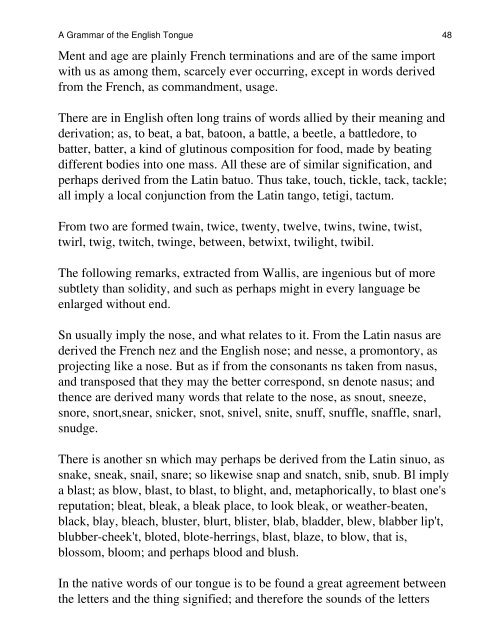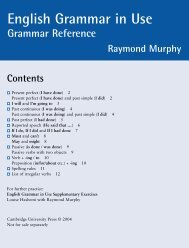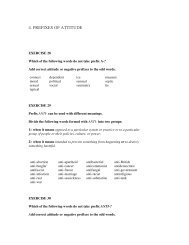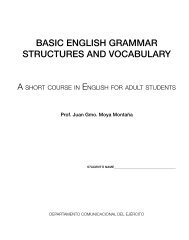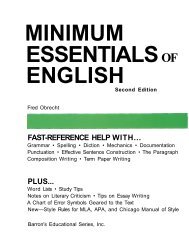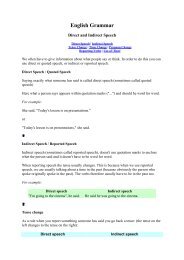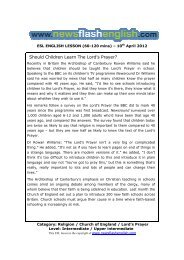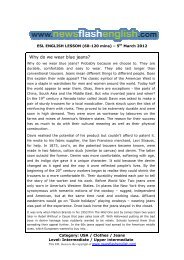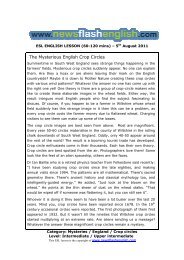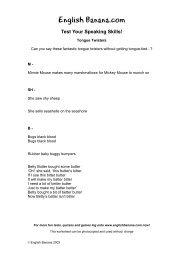A Grammar of the English Tongue - ESL Teachers Board
A Grammar of the English Tongue - ESL Teachers Board
A Grammar of the English Tongue - ESL Teachers Board
You also want an ePaper? Increase the reach of your titles
YUMPU automatically turns print PDFs into web optimized ePapers that Google loves.
A <strong>Grammar</strong> <strong>of</strong> <strong>the</strong> <strong>English</strong> <strong>Tongue</strong> 48Ment and age are plainly French terminations and are <strong>of</strong> <strong>the</strong> same importwith us as among <strong>the</strong>m, scarcely ever occurring, except in words derivedfrom <strong>the</strong> French, as commandment, usage.There are in <strong>English</strong> <strong>of</strong>ten long trains <strong>of</strong> words allied by <strong>the</strong>ir meaning andderivation; as, to beat, a bat, batoon, a battle, a beetle, a battledore, tobatter, batter, a kind <strong>of</strong> glutinous composition for food, made by beatingdifferent bodies into one mass. All <strong>the</strong>se are <strong>of</strong> similar signification, andperhaps derived from <strong>the</strong> Latin batuo. Thus take, touch, tickle, tack, tackle;all imply a local conjunction from <strong>the</strong> Latin tango, tetigi, tactum.From two are formed twain, twice, twenty, twelve, twins, twine, twist,twirl, twig, twitch, twinge, between, betwixt, twilight, twibil.The following remarks, extracted from Wallis, are ingenious but <strong>of</strong> moresubtlety than solidity, and such as perhaps might in every language beenlarged without end.Sn usually imply <strong>the</strong> nose, and what relates to it. From <strong>the</strong> Latin nasus arederived <strong>the</strong> French nez and <strong>the</strong> <strong>English</strong> nose; and nesse, a promontory, asprojecting like a nose. But as if from <strong>the</strong> consonants ns taken from nasus,and transposed that <strong>the</strong>y may <strong>the</strong> better correspond, sn denote nasus; and<strong>the</strong>nce are derived many words that relate to <strong>the</strong> nose, as snout, sneeze,snore, snort,snear, snicker, snot, snivel, snite, snuff, snuffle, snaffle, snarl,snudge.There is ano<strong>the</strong>r sn which may perhaps be derived from <strong>the</strong> Latin sinuo, assnake, sneak, snail, snare; so likewise snap and snatch, snib, snub. Bl implya blast; as blow, blast, to blast, to blight, and, metaphorically, to blast one'sreputation; bleat, bleak, a bleak place, to look bleak, or wea<strong>the</strong>r-beaten,black, blay, bleach, bluster, blurt, blister, blab, bladder, blew, blabber lip't,blubber-cheek't, bloted, blote-herrings, blast, blaze, to blow, that is,blossom, bloom; and perhaps blood and blush.In <strong>the</strong> native words <strong>of</strong> our tongue is to be found a great agreement between<strong>the</strong> letters and <strong>the</strong> thing signified; and <strong>the</strong>refore <strong>the</strong> sounds <strong>of</strong> <strong>the</strong> letters


